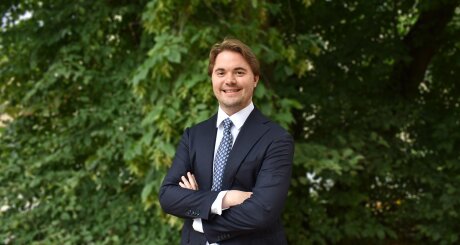European elections: "Discussions around collaboration must develop positively" (M.Björnmalm, Cesaer)
"Far-right populism often brings scepticism towards the EU
European Union
and international collaboration. We must mitigate these negative directions, whether it is around EU scepticism or broader reluctance towards international cooperation. It is essential that these discussions develop positively so that universities can contribute effectively to these areas", states Mattias Björnmalm
![]() Secretary General @ Cesaer
Secretary General @ Cesaer
, Secretary General of Cesaer
Conference of European Schools for Advanced Engineering Education and Research
, the European association of universities of science and technology to News Tank on 31/05/2024.
When asked about the messages to be conveyed on the eve of the European elections, he says:
"I welcome the example of Maria Leptin, the President of the European Research Council, who has called on the ERC
European Research Council
community to vote, emphasising the European Parliament's significant decision-making role."
Regarding the messages that deserve to be advocated for before the next European Parliament and Commission, Mattias Björnmalm indicates that "while political leaders acknowledge the importance of advanced technologies, artificial intelligence, and other scientific areas, there have been budget cuts to Horizon Europe. This discrepancy highlights a lack of understanding of how these areas are connected".
Moreover, according to him, "research, education, and innovation should not be isolated. It should be on the agenda of the full College of Commissioners and be directly linked to what all the funding programmes do. This was also one of the key design considerations we put forward in our December paper for FP10".
"Encourage the community to vote, emphasising the European Parliament's significant decision-making role"
What messages do you think are important to get across before the elections? Have you talked to your members about it?
I welcome the example of Maria Leptin, the President of the European Research Council, who has called on the ERC community to vote, emphasising the European Parliament's significant decision-making role.
It is crucial for communities, especially those not directly engaged with Brussels, to understand that the Parliament, as a co-legislator, shares the final say with Member States on many European matters.
Her letter encourages the ERC community to vote and spread the message that the European elections are upcoming. University staff, including professors, students and leaders, can help share this with their networks across Europe. The decisions made in Brussels impact everyone in the EU and beyond, making it vital for these decisions to reflect the will of European citizens.
Internally, we have been ramping up activities over the last year to encourage and inform our members. Organisations like ours should act as amplifiers, informing and encouraging our broader communities to participate in the elections to ensure that the European Parliament and its influences, including the European Commission, reflect Europe's interests and priorities.
The vital importance of research, education and innovation, and scientific knowledge and technology, for the future of our societies »Regarding the messages, they have been focused on the vital importance of research, education and innovation, and scientific knowledge and technology, for the future of our societies.
What was the content of the activities you addressed to your members about the election?
Our targeted information has been strategic, focusing on ongoing developments in Europe. At the end of last year, we worked with EU institutions and the European Commission to ensure important topics and dossiers were finalised before the current legislature ended.
Our role included informing our members about key political trajectories, such as industrial policy, defence and security, European enlargement, cost of living, inflation, and artificial intelligence, and feedback considerations from universities of science & technology to help guide these developments.
These topics are closely linked to science and technology, and as such, have a significant impact on universities of science and technology, as the only actor that combines research, innovation and education at the highest level.
A concrete outcome of these efforts was our support for the #ResearchMatters campaign , emphasising both the economic and societal importance of research and research-based education in science and technology.
Does any of your members organise information desks for students or debates?
While not organised through our services, many of our members are sharing information about the upcoming elections. Some are actively participating in political discussions through their internal bodies, like student unions.
It is part of their role to support their communities' active engagement in society, which includes participating in elections and political discourse.
"When discussions turn critical towards the EU or international collaboration, it becomes worrying"
The result of the European elections in the current political context will bring changes. Are there any risks you foresee?
One ongoing challenge is the importance of collaboration within the European Union and beyond, especially for universities of science and technology. This collaboration includes our friends in the United Kingdom, Switzerland, and the rest of the continent.
It is crucial for advancing scientific knowledge, technological innovation, and talent development. We need highly trained people to come to Europe, stay in Europe, and support talent in Europe to be among the world's best. Working together as a cohesive unit is vital for contributing at a global level.
This trend can negatively impact universities' ability to attract talent »When discussions turn critical towards the EU or international collaboration, it becomes worrying. This trend can negatively impact universities' ability to attract talent and work with researchers globally. Only by working together as a continent can we contribute global leadership in science and technology. The rise of hesitancy or even hostility towards the EU and international collaboration is therefore deeply concerning and counterproductive.
Cesaer and its 50+ member universities aim to showcase the importance and value of these collaborations while combating misinformation and contributing to a well-informed society supported by the latest scientific knowledge and technological innovation. It is important for citizens to have the tools to make informed decisions and see through misinformation, despite its increasing difficulty.
Regarding far-right populism, it often brings scepticism towards the EU and international collaboration. We must mitigate these negative directions, whether it is around EU scepticism or broader reluctance towards international cooperation. Industrial policy and security discussions are also critical. It is essential that these discussions develop positively so that universities can contribute effectively to these areas.
What are your recommendations for aligning the current discussions on industrial policy and competitiveness with advancements in science and technology?
Initially, the discussions focused on supporting European industries to compete globally, potentially involving state aid or subsidies. No matter how, what is crucial for us is that any strategy around competitiveness, reindustrialisation, or strategic autonomy must engage with the concept of leadership in science and technology.
Science and technology are transformative, and research, education, and innovation underpin this transformation. Long-term strategies for competitiveness, industrialisation, or strategic autonomy must prioritise leadership in these areas. We recently published a position paper outlining five concrete areas where activities are needed to enhance this leadership.
It is important that political leaders fully appreciate the connection between advanced science and technology and their implications for competitiveness, reindustrialisation, and strategic autonomy. For example, boosting Horizon Europe with additional funding would be a concrete action reflecting this understanding.
This broader approach moves away from viewing industrial policy in a narrow view, for example in terms of state aid or subsidies and focuses on fostering leadership in science and technology.
"While political leaders acknowledge the importance of scientific areas, there have been budget cuts to Horizon Europe"
The biggest part of the work on setting up the Multiannual Financial Framework and distributing the funds for Erasmus + and FP10 will be done by the new Commission and the new MEPs Member(s) of the European Parliament . What messages will you be sending out then?
In December, we issued a paper outlining six specific key design considerations needed for FP10. More generally, we have seen a trend towards underappreciating the importance of research, education, and innovation at the political level.
While political leaders acknowledge the importance of advanced technologies, artificial intelligence, and other scientific areas, there have been budget cuts to Horizon Europe, the primary instrument for advancing research and innovation in the EU. This discrepancy highlights a lack of understanding of how these areas are connected.
Similarly, the Erasmus+ program has not received the full appreciation it deserves for its broader educational and societal impact. Our advocacy focuses on boosting the shared understanding of how research, education, and innovation contribute to societal priorities like sustainability, resilience, and buttressing democratic institutions.
We aim to emphasize this through the Research Matters campaign and other initiatives, working with both national and EU political leadership.
Is a Commissioner for education and research in a single portfolio important for Cesaer? Are you working on advocating for this?
We welcomed having a Commissioner covering the knowledge triangle (research, education, and innovation). This connection at the political level is crucial. However, the current cycle's Commissioners have had additional dossiers, such as sports and culture, which complicated their focus on the knowledge triangle. While I appreciate the synthesis, I believe it could be more effective with fewer additional responsibilities.
Moreover, research, education, and innovation should not be isolated. It should be on the agenda of the full College of Commissioners and be directly linked to what all the funding programmes do. This was also one of the key design considerations we put forward in our December paper for FP10.
Making sure that all the EU funding programmes can also support research, innovation and education activities »It is not about diverting money from Horizon Europe into a lot of different areas, it is about making sure that all the EU funding programmes can also support research, innovation and education activities because it will help them deliver on their own objectives in the broader sense.
For example, the Green Deal is an instrument aimed at boosting sustainability including reducing our carbon emissions. Many political decisions have been made, but without a foundation of research and innovation to meet the needs of the political changes brought about, it is like a plane in flight without a landing strip. Building that landing strip requires ongoing efforts in research, education, and innovation.
It is increasingly urgent to enhance activities and financial support for research, education and innovation in science and technology to ensure success in key areas such as the Green Deal and the digital transition while boosting resilience and well-being in Europe.
Career
Secretary General
Invited Member, Science/Technology & Policy, WEF Expert Network
Deputy Secretary General
Senior Advisor for Research & Innovation
Advisor for R&I
Editor, Science & Policy
Vice-Chair, Policy
Research Fellow
Studies & Diploma
Marie Skłodowska-Curie Individual Fellowship, Bioengineering and Biomedical EngineeringMarie Skłodowska-Curie Individual Fellowship, Bioengineering and Biomedical Engineering
Doctor of Philosophy (Ph.D.), Chemical and Biomolecular Engineering
Master of Science in Engineering Nanoscience
# 51699, created on 03/06/24 at 19:03 - Updated on 05/09/25 at 17:59


